Today marks the last day of my first week in Malawi, and what a week it has been! I started in Lilongwe, the capital city. While there, I stayed in a Safari camp for a night before meeting with Embassy staff and travelling on to my new home, Domasi. For those unfamiliar with the idea of a Safari Camp, it's basically a rustic youth hostel set up to look like the kind of place you might stay if you were on a safari. This one might be considered very rustic by many people's standards (especially those accustomed to 5-star hotels, which luckily I'm not). It has a small lobby/lounge/bar area, and several small hut-like cabins with thatched roofs, complete with a mosquito-net covered bed, and electricity, but no T.V. and no phone (oh, the horror!). Though I have stayed in similar accommodations before, I was a bit shocked at first, only because I was there on business, and knew I'd have to "primp" to look presentable in the morning. The shared bathroom accommodations were equally rustic, though there was hot water available. The short hike to the toilet at 3 a.m. and to the shower at 6 a.m. were probably the greatest inconveniences I faced.
The best part of staying in this place, however, was the friendly atmosphere. Because it is so low-key, and owned by a young British ex-pat couple (Yes, the Brits, like the Americans, tend to be much friendlier when overseas), people tend to be friendlier than in most 3-5 star hotels. So, in the end, I managed to meet 2 lovely British women (almost ex-pats) who invited me out to see a "jazz" band (which was really more of a reggae/pop/African music band). We were picked up by a lovely woman from the Netherlands with a perfect British English accent in a white Toyota truck-- which, apparently, is the most popular vehicle in Malawi-- model, color, and all. Toyotas rule in Malawi. They love them here. Back to the story. So, we drove to the small club hosting the afternoon jazz band, as my new companions sang the praises of Malawi. All three of them had been here for at least several months, and all of them really loved it. Julie and Liz, the two women staying at the safari camp, were leaving within the next couple of days, and were visibly depressed about it. So, it seemed to me I'd come to the right place. We had a lovely afternoon and evening, sipping gin and tonics (I'll have to pick up some of the famous Malawi Gin for my sister's Christmas present... oops, not a surprise now). I'm not a big gin connisseur (sp?), but wow, it was good stuff. Eventually we got dancing (maybe it was the gin?), and several locals came up to join us, even though we were probably doing the "white-girl's overbite."
Our night of Jazz, gin, and jiggin' ended with a pizza dinner at a rather upscale western restaurant. Luckily I've lived in enough developing countries to know this evening wasn't typical, but still it was a very enjoyable first night in the country, and I made a few new friends that hopefully I'll meet again someday.
The following morning, the driver for the Embassy picked me up at 7:05 a.m. (exactly 25 mins. early). I was soon to find out that Malawians are early to bed, early to rise types. They almost literally rise and fall with the sun. The days here are relatively short, with the sun rising at about 6 a.m. and setting at 6 p.m., all year round. Most Malawians are in bed by about 9 p.m. and up by about 5 a.m. I asked Mr. Banda (whom you'll hear more about later) about this phenomenon today, and he told me that they get up early "to sweep around the outside of the house." The girl I met today named Funny said the same thing. She gets up at 5 a.m. to sweep as well. So far, I haven't found out why the sweeping must be done at this hour, but when I discover the secret, I'll be sure to post it here.
So, I digressed. My trip to the embassy was relatively uneventful. I had about a 10-minute security briefing during which I learned that Malawi is basically a safe place, and just to be aware of pick-pocketers when in the city, not to walk alone at night if it can be avoided, and general things one needs to do in any city just about anywhere (except perhaps South Korea, where I never felt unsafe.). We then did a little bit of shopping for household necessities, got some pizza for the road, and were off to Domasi and Zomba, about 4 hours' drive south of Lilongwe. I'll be working in both places, but living in Domasi. Zomba is the former capital of Malawi, and is a relatively developed town by Malawian standards. While driving through the countryside, I noticed what I imagined to be typical of this country. We passed many small villages where people lived in thatched roof houses and huts, and seemed to survive by subsistence farming. It is quite a poor country, but ironically, as pointed out by Pamela, my main contact at the embassy, the people here rely almost exclusively on rainfall to irrigate their crops. This is ironic because unlike many African nations, about 20 percent of this country is covered by surface water; of course the biggest being Lake Malawi, with 2 smaller lakes, Lake Chilwa, and Lake Malombe, as well as the Shire River (pronounced in the Chichewa "Shi-ray," not the English "shire" like in Worcestershire or Gloucestershire... am I losing focus? Sorry, I do that sometimes...). In any case, for some reason the people/governments/organizations here have not managed to create better systems for irrigation to improve the year-round cultivation of crops and prevent starvation here during the dry season (June-Sept.).
While driving through the country, I of course had an excellent opportunity to view the countryside, mountains, villages, river, and roadside markets. They do things here the way we used to do them in the U.S., as well as the way some eco-conscious movements are urging us to do them. If you've ever heard or seen the slogan "buy local," especially in reference to produce and meat products in your region, you know what I'm talking about. Here, that's how it's done. Buying produce and, largely, meat, from the supermarket is considered insanity here, as it usually isn't very fresh, nutritious, or tasty. Of course, this reminded me of growing up in Wisconsin and going out to the farms to buy produce and eggs with my Dad, as well as helping him grow vegetables in the garden during the summer. How I've missed those fresh vegetables over the years. Now, I eat them regularly. Organic? Forget it! It's a given here.
We spent the first night (Monday, Sept. 10) in Zomba, in the American Embassy Cottage. Yeah, that's right. This is where a good chunk of our tax money goes. Some U.S. diplomat at some point saw this beautiful mountain overlooking the Zomba Plateau and said, "Hey, why don't we build ourselves a nice little getaway? We've got some extra tax money, eh?" (no, that was the Canadian guy)... er, "We've got some extra tax revenues to spend, right? Let's do it!" So now, there's this beautiful 3-bedroom cottage on top of the mountain with all the amenities (plumbing, electricity, fireplace, outdoor BBQ pit, but amazingly no T.V.) , overlooking the Zomba reservoir/dam, and you and I are paying for it! Well, I'm not so mad about it, since at least I got to stay in it for a night. But I do feel badly for the rest of the hard-working tax-paying Americans out there. Oh, well, at least you've got free public education, decent roads, dependable electricity (I've experienced 2 blackouts this past week--2-3 hours each), and politicians who are looking out for your every need, so stop whining, willya? (Hmmm... I wonder how many will continue reading this now. Come back! It's just a joke! Lighten up!)
OK, so now on to Tuesday, Sept. 11 (OK, so now I feel a little bad about that joke). After driving down Zomba Mountain, we went to visit the officials at Chancellor College, which is one of the institutions at which I'll be working (The other is Domasi College of Education). The visit was relatively uneventful, as I met with the head of the Languages and Communications Dept. briefly to talk about a class I'll be helping to teach, titled "Language and Communication Skills," which is a required course for all Freshman entering the college. In some ways, it's similar to a Freshman Composition Course in the U.S. Mr. Kankuzi (the director) gave me the syllabus, we discussed it a bit, and set an appt. to meet with the current instructor the following day at 9 a.m. (luckily, not at 7:30 a.m. which is when the typical workday starts here).
We then went on to Domasi College of Education , about 20 mins. drive away, and I met with the Principal and Deputy Principal, and got to see my house. I was very excited and also nervous about that, as I wasn't sure exactly what to expect. In the end, I was pleasantly surprised, especially by the size and the beauty of the surroundings. The house is quite big (3 bedrooms), made of brick, and very nicely landscaped with flowers and trees. The back yard is also quite big, with a thatch-fenced space for a vegetable garden (Yahoo!). I also live on campus, and all of my neighbors are staff at the college, so it's a nice, friendly, safe community. In fact, I can honestly say it's one of the nicest neighborhoods I've ever lived in, both in terms of aesthetic beauty, as well as friendly, caring neighbors (wow, what a concept... In the U.S., I rarely even knew my neighbors' first names). In fact, on that first night, 3 young girls, 2 of which lived next door came over to welcome me. They saw me outside treating my mosquito net (yes, everyone uses them here-- Malaria is a serious problem--luckily, I've got drugs, but most people here do not.), and waved to me and said hello. Of course, I did the same back to them, and then went inside to get something. Immediately, I heard children chattering loudly outside my window, and sure enoough, there they were, waiting to greet me outside my back door. We had a very nice, friendly conversation in which they tried to teach me some Chichewa (the local, official language along with English), though I didn't really learn anything until a few days later. They were very sweet girls, and were later joined by several other younger children. Of course, I had to do the typical new foreigner thing and get a picture. I told them that they were my "welcoming committee," and taught them to say "cheese" as I took the picture, which they did with great enthusiasm.
So, my first evening in Domasi was quite unique compared to most other overseas first-nights. I'm usually all alone and don't meet anyone, spend a lot of time asking myself what I've done, often involving some sort of blubbering, tears, depression, what have you. But this time, that didn't happen. I really felt o.k. Besides missing certain special people that I left back home, I was generally o.k. here. Ironically, I thought this might be the most difficult overseas living experiences I'd ever had, but it's turned out to be just the opposite. Ironies abound here, so I've seen.
The next day was a bit more riddled with the inconveniences of adjusting to life in a developing country. I was picked up at 9 a.m. (late morning by Malawian standards) by Zonda, one of the teachers at Chancellor College, who took me to Zomba to observe his Language and Communications course, which is the one I'll be taking over a week from this coming Monday. He was very kind, and a published poet, as I found out when I happened to notice a book of his poetry sitting on the seat (strategically placed, perhaps?). He kindly let me borrow it, and I've been reading it before bed every night. It's actually quite good, especially for me, as if I read any poetry, I prefer that which focuses on the natural environment, and his does. It's given me more insight into the weather, animals, plants, and other natural features of this land (Oops, did I digress again? Sorry.) In any case, I observed his class, mostly taught in a lecture format, though he has quite an interesting, relaxed, but humorous style which most students seemed to appreciate. The class is miniscule by Malawian standards, with only about 40 students (they usually have upwards of 100 students per class). It appears they took some pity on me by assuring me a smaller class size. These people are fabulous! Though the students came in with a lot of energy and seemed like they might not be as attentive at first, they quickly changed their tune once he began the lecture, and really seemed to focus and hang on his every word. I was a bit concerned at first because I normally don't teach using a lecture format, but later in the lesson he did give the students an activity for practice, which they immediately began working on without too much trouble. I had the opportunity to circulate and assist a few of the groups as well, and they seemed to be very appreciative and respectful, as well as hard-working. I'm assured that this is a particularly committed class, so I'm hopeful that this classroom dynamic will continue once I take over. Only time will tell. I'll keep you "posted."
Wednesday afternoon was especially interesting, as Zonda dropped me off in the center of town, where I met with Mr. Banda, who is the man responsible for all of my basic needs, primarily housing, transportation, and security. I had actually met Mr. Banda the previous day when I moved into my house, when we also found out my water had not yet been turned on, and the place needed some serious cleaning, especially the kitchen. I'll spare the details, but let's just say that a certain amount of rodent excrement gracing the top of the woodburning stove (which, thankfully, I don't plan to use at all) was enough to spur a serious outbreak of hantavirus throughout the southern region of Africa. Consequently, Mr. Banda had to arrange for the water activation (a very drawn out process of which I'll spare the details, except to say that it involved a 4-wheel drive excursion to the water treatment plant through a small village where cars were a novelty based on the locals' reactions as we drove past). Once the water was turned on, the cleaning crew was sent in to attack the rat excrement (so far, no sign of rodents...I'm watching and listening, though... I'll keep you "posted"). As a sidenote, the cleaning crew was all male, and I'm told that many privately-hired cooks here are also male, which was a refreshing realization, and another irony to add to my list.
O.K., so back to Wednesday. We spent the first 2 hours of the afternoon at the bank. Basically, opening a local bank acct. takes some time here. Many locals also seemed to wait for awhile. Eventually, we got it done, but I later received a call on my cellphone asking that I have my bank write a letter to the National Bank of Malawi assuring that I had enough funds to cover the personal check I wrote to open the account. I asked that they just wait for the check to clear, as that likely would take less time than having my bank write a letter to them. They reluctantly agreed. I now think it might've made more sense to just handle my banking internationally from home, since I'm being paid into that bank acct. anyway, I have internet banking privileges, and the fee for international ATM withdrawals here is only $1 (amazingly). Hmmm... Maybe I'll just go back on Monday and close it. I'll have to clear that with Mr. Banda first. He's the man (see picture at left for details).
After the banking fun, we went to the market to pick up some basic items I needed for my house, and some food, since most of the food I bought the previous day was in cans (due to lack of a frig which was delivered later), and I didn't think to buy a can opener. Luckily, I did buy some eggs and rice, so that was dinner and breakfast. MMM... those days of subsistence on fried eggs and rice in China have prepared me for anything and everything! Now, this was where the "I'm really living in a developing country" bells finally went off (no, we don't say 3rd World anymore--I was corrected on that recently, so be aware). I needed basic things like, well, a can opener. I thought I could find one of those things, you know, like we have in the states, with the 2 round blades and the crank, and it clamps on the side of the can. Nope. Here, you can only find those ones that have the triangular blade (usually used to open juice cans), and then there was this other one with an interesting shape, that I thought might be better, so I bought it. Needless to say, later that night, I struggled for awhile to get that canned fish open. Let's just say there was a lot of bashing and bending going.
Shopping in Malawi is unlike anywhere else I've lived. Well, at least in Zomba. The store that had the most items also was missing many things. This is a store called "PEP," based in South Africa (where most things are imported from... in fact, just about EVERYTHING in Malawi is imported). For example, they sell duvets, but not pillows. They sell forks and spoons, but not butter knives. They sell plastic food storage containers, but not ice trays. They sell sharp cutting knives, but not scissors. When we couldn't find these items, we decided to go to the market. Nope. None of them were there, though I did find some interesting 80-year old metal scissors. So far they seem to work o.k., though I haven't tried anything intricate like paper snowflakes. I'll keep you "posted."
As for food, we had better luck in that department. This is likely because I'm generally easy to please when it comes to food. What's good (and somewhat bad for lazy people like me) here is that you cannot find many processed or pre-made foods here. You have to be willing to cook, and plan meals to some degree. You also have to be willing to go to the market and visit several vendors for several items: One guy for tomatoes, another lady for potatoes, someone else for onions, and someone else for beans. That's just how it works. It's hard work. It's a full-time job, which is why most married women stay home and do the full-time job of managing the household (starting with sweeping at 5 a.m. and ending with the evening meal for which she walked several miles to the market to haggle with 20 people for different vegetables, and then came home to hand-wash the clothes, cook the meal, clean up, all while taking care of the kids... you get the drift). Oh, but there is another way. Working women have help. The housekeeper/cook (sometimes one person, sometimes 2). Guess what? I got one, too! Now, this wasn't easy for me, as I was not raised in a culture of servitude. However, in hiring this young woman, I saw the opportunity to help her out. You see, she needs to save money to go back to school, and in working for me, she can actually manage to do that. In addition, she lives in a small, thatched roof hut with her mother and her younger brother. She's 19 years old, and wants to have more independence. I'm also living alone in this big house. So, why not hire her and let her live with me? So, starting on Friday, she began working for me. She's also taught me more Chichewa expressions, and now I can finally remember some of them (MuliBwangi= How are you? MaSwelaBuangi =good afternoon/evening Zikomo= thank you-- and no, I'm not using notes!)
So, it's really a wonderful set-up. She gets a nice place to live and enough money to go to school, and I have someone to stay with me and help me around the house. I still do take care of a lot of things, as I can't stand having someone do everything, but it is nice to have her around. Her name is Deliwe, and I plan to add her picture here in my next post. I also hired a gardener who will start on Monday, but I plan to help him out a lot (if he'll let me), because I prefer gardening to housework any day, and I want to learn more about the amazing plants here. He's also agreed to do a vegetable garden, so we won't have to go to the market and haggle as often.
So, I think this brings me to today. Today, I really didn't have anything to do. I gave Deliwe the day off, and after she went, I decided to take a walk in the area outside of the campus neighborhood. At the edge of the campus, there are many small trails, mostly used by people walking from the villages to the campus. I decided to explore those today. As I was walking, I met a young girl coming back from the library at Domasi Secondary Demonstration School, which is just up the road from Domasi College. She was very sweet, and told me her name was Funny. I thought that was funny, but that's her name, so I tried not to laugh. She told me that she has her big national exams starting on Monday (British system-- the kids must pass exams at the end of each year in order to move on to the next grade level. If they fail, they cannot move on. Instead, they have to take private lessons to learn the material and re-take the exam, which costs money. The poor cannot usually afford it, so they drop out. This is what happened to Deliwe.) In any case, she was very happy to meet me, let me take her picture, and said she would come to my house meet me at 2 p.m. tomorrow. I think she feels badly for me living all alone. I told her about Deliwe, and she was very excited, as she knows her. Most people here seem to know each other, and also seem to like each other. I know it sounds corny, but it really seems to be true. Well, at least I like to think so.
After saying goodbye to Funny, I continued up the road and found another village with a small mosque that I'd found a couple of nights ago (I'm actually in an area heavily populated by Muslims, though there are many Christians here too, and 80 percent of the country is Christian). I took a few pictures, and then wanted to peer into the windows, since I'd never really been to a mosque before. Suddenly I heard someone call out, "Jennifer! What are you doing here?" I was shocked. Who could it be? I don't really know anyone here! I look up and see it's Mr. Banda. He's the man. He found me in the middle of nowhere, almost in the act of the worst type of vuoyerism (sp?)--the religious kind. Luckily, he stopped me just in time, as someone was praying inside, and during the month of Ramadan. Whew! So, I spent some time talking with Mr. Banda, hanging out in his house and discussing religion, actually. He happens to be Muslim, so we talked a bit about Ramadan, and my feelings about organized religion (which are primarily negative and somewhat unforgiving), and he was overall receptive to my point of view. He also explained to me about the 5 a.m. sweeping. Incidentally, speaking of religion, I met a Catholic nun today as well. Her name is Sister Anastasia, and she's my next door neighbor, as well as the mother of 2 of the girls in the "Welcoming Committee." I imagine she adopted them, unless the interpretation of the Catholic religion here is much different from that back home. She actually gets up at around 4 a.m. to pray. I think she sweeps after that.
Speaking of waking at dawn or before, it's now 9:10 p.m. here, and I imagine Daliwe is getting ready for bed by now. She probably cooked something, and I wasn't there to eat it. I tried to explain that she's off on Saturdays, but I think she prefers to sleep at my place, so most likely she's made some dinner. In the future, I should have internet at home, so I'll be in by sundown most evenings to complete my blog entries. I plan from now on to post once per day, so in the future these will not go on and on in the way this one has. However, I'm not making any promises. Welcome to Me 'n Malawi!
DISCLAIMER
This website is not an official U.S. Department of State website. The views and information presented are the English Language Fellow's own and do not represent the English Language Fellow Program or the U.S. Department of State.
Subscribe to:
Post Comments (Atom)






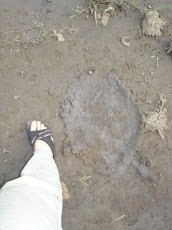













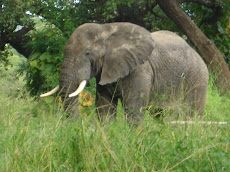



































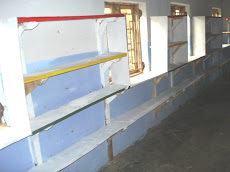




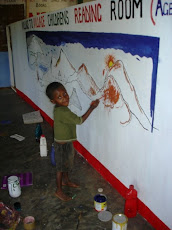








































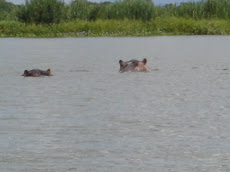

















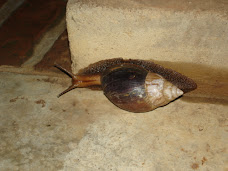






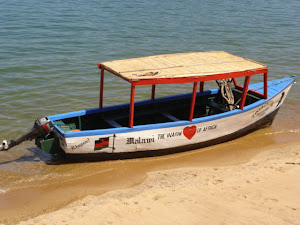














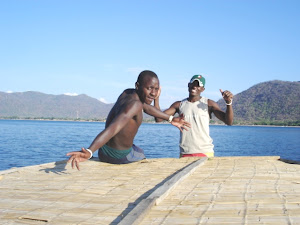
















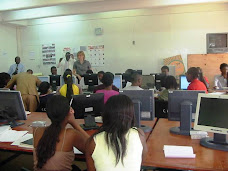
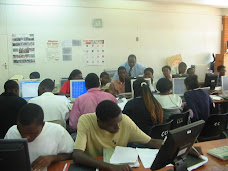
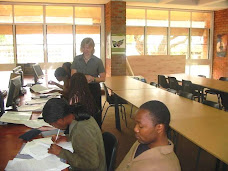








































































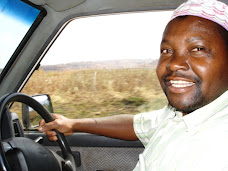




























No comments:
Post a Comment